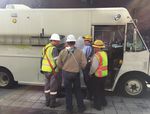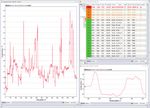EEI 2018 Edison Award Nomination Submitted by Indianapolis Power & Light Company for - NKT Photonics
←
→
Page content transcription
If your browser does not render page correctly, please read the page content below
EEI 2018 Edison Award Nomination Submitted by Indianapolis Power & Light Company for IPL FIBER OPTIC TEMPERATURE MONITORING SYSTEM EXECUTIVE SUMMARY After experiencing challenging media coverage and public outcry over safety concerns following cable fires and dislodged manhole covers in its downtown network, Indianapolis Power & Light Company (IPL) became proactive in discovering and employing an innovative solution that has shown remarkable success over the past two years. By taking technology used in the oil pipeline industry, IPL partnered with Texas-based Fiber Optic Pipeline Solutions to be the first electrical utility ever to use a distributed temperature sensing (DTS) system to monitor external high-temperature threats in an underground network secondary grid. We proudly submit our nomination for the 2018 Edison Award, touting the results of our Fiber Optic Temperature Monitoring System. The following pages will demonstrate how this innovation helped IPL improve the safety and reliability of the fundamental life element we deliver: energy for 490,000 customers and more than 28 million visitors - people who expect to be able to turn on their lights and have power, while in the city of Indianapolis.
THE PROBLEM
Steam. It may seem like an antiquated heat source. Steam was corroding our cables, degrading their outer
But here in Indianapolis major businesses, hospitals jackets and prematurely aging them. Steam – with its
and corporations use it each and every day. In fact, ability to deform conduit if exposed long enough to
Indianapolis has one of the largest steam distribution leaks, was indeed an issue we needed to tackle.
systems in the U.S.
In the past, we relied on a steam company’s annual
For many years, steam was a contributing factor in thermal survey and our own crews, who would
causing considerable safety issues in the heart of report any heat issues encountered during routine
downtown, and near IPL’s underground infrastructure inspections. But those two tactics – though helpful
and power cables. – were not comprehensive, leaving heat issues to go
undetected for a year or more.
THE INNOVATION
Discovery, How the DTS works and the Pilot that set vision to life.
Discovery
Indianapolis Power & Light (IPL) needed to be more that year, IPL and FiOPS installed and commissioned
proactive to address steam issues in our city. We a DTS pilot to evaluate the effectiveness of the
needed to look beyond the status quo and reach for system.
an innovative solution that would improve safety for
our employees, city residents and visitors. Fiber Optic Pipeline Solutions (FiOps) introduced
our team to its DTS system, and from there, our
That solution came in the form of a distributed team’s vision began the steps toward reality.
temperature sensing (DTS) system - technology that
had never before been used in the electric utility
underground network space.
In late 2015, IPL partnered with FiOPS to devise a
DTS system that would enable IPL to proactively
monitor external high-temperature threats from the
steam distribution system in real time. By June of
LIOS DTS Controller
IPL FIBER OPTIC TEMPERATURE MONITORING EEI 2018 Edison Award Nomination 1How DTS Works
A typical DTS system contains three components: DTS controller,
standard multimode fiber-optic cable and a server to store the
data. The DTS controller turns the fiber-optic cable into a linear
sensor that has a spatial resolution of approximately 3.28-ft (1-m)
increments with an accuracy of ±1.8°F (±1°C).
How the DTS controller measures the temperature is based on
the principle of Raman scattering. Thermal effects induce lattice
oscillations in the glass fibers, which, in turn, cause light to be
scattered back to the DTS controller. The DTS controller interprets
two components of the backscatter, stokes and anti-stokes, to
determine the temperature at any given point along the fiber. The
time it takes for the backscatter to reach the DTS controller is used
THE OUTCOME
to calculate the precise location of the thermal event. Once the route was commissioned and
on-line, this unprecedented system
HOW DTS IS IMPROVING IPL’S started delivering what we hoped.
SAFETY AND RELIABILITY Hot spots and the beginnings of a
steam leak were detected in one area
Much has been learned from the application of the DTS system. In in real time; issues of which both
addition to monitoring for deltas in temperatures due to possible IPL and the steam company had not
steam leaks, we have learned that the DTS can detect secondary previously been made aware. By the
fires and cable faults. end of July 2016, the temperature in
one particular area had risen to more
On June 23, 2017, the DTS system detected a manhole fire in
than 135F° (75.2C°) and was climbing
the downtown network. Within 7 minutes and 30 seconds, the
steadily. The DTS system alerted IPL
temperature rose from 35.19°C to over 165.87°C. This rapid
to the situation so the utility and steam
temperature spike, alerted us immediately of the situation and
company could address the issue in a
pinpointed exactly where the problem area was in our network.
timely manner before any damage was
done to IPL’s infrastructure and cables.
IPL’s mission is “Improving lives by providing safe, reliable and
affordable energy solutions in the community we serve.” Having the
A month later, IPL’s senior management
DTS system enables IPL to monitor situations in the network and
gave the engineering team the go-
proactively investigate potential high temperature events. This
ahead to install additional routes
monitoring helps to limit potential network events and unforeseen
for the DTS system in the secondary
high temperature situations.
network to monitor threats from
steam.
In addition, IPL meets with the local steam company on a regular
basis to discuss reports of steam anomalies within the Indianapolis
By the close of 2017, IPL had installed
Central Business District. In 2012 when the monthly meetings
four radial fiber-optic routes consisting
began there were 57 anomalies listed in a multi-page report.
of approximately 37,000 ft (11,277
Currently there are 24 steam anomalies on a single-page report.
m), which is currently monitoring
Over the last 12-months this number has been as low as 19.
about 50 percent of the steam system,
as it relates to IPL’s infrastructure. In
The DTS system has proven to be a very promising technology
addition, IPL installed a second DTS
for use in secondary networks. Employing DTS and fiber optic
controller at a substation near the
cable eliminates the need for thousands of individual sensors.
downtown network secondary grid for
With this innovative approach to monitoring temperature changes
redundancy purposes. Data from the
throughout the underground infrastructure, IPL customers,
two DTS controllers is stored on two
guests to Indianapolis and our employees can live, visit and enjoy
servers at separate locations.
downtown Indianapolis - knowing there is a safe and reliable
underground network system beneath their every step.
IPL FIBER OPTIC TEMPERATURE MONITORING EEI 2018 Edison Award Nomination 2SUPPORTING DATA
Graph and table
showing temperature
vs. distance. Notice
the large variation in
temperatures over the
length of the cable. The
zoom in the lower right
pinpoints the hottest
location.
Hot spot located on map
Indianapolis Power & Light Company provides retail electric service to more than 470,000 residential, commercial
and industrial customers in Indianapolis, as well as portions of other Central Indiana communities surrounding
Marion County. During its long history, IPL has supplied its customers with some of the lowest-cost, most reliable
power in the country. For more information about the company, visit www.IPLpower.com.
IPL FIBER OPTIC TEMPERATURE MONITORING EEI 2018 Edison Award Nomination 3Rapid temperature
increase over a few days
proves value of continuous
monitoring. Temperature
increased 30 ˚F in only
eighteen days.
Example of 350 kcmil Cu EPR 15 kV cable damaged
by steam. This cable is at the end of useful life after
only three years of service.
The graph above shows the temperature trace between Sept 1st and Oct 25th. The blue
boxes indicates periods of precipitation. The temperature would spike shortly after each
rain event.
IPL FIBER OPTIC TEMPERATURE MONITORING EEI 2018 Edison Award Nomination 4You can also read



























































